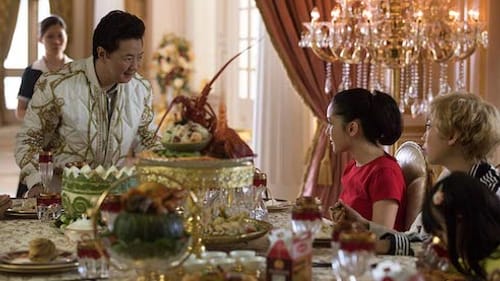Stay in the Loop
BSR publishes on a weekly schedule, with an email newsletter every Wednesday and Thursday morning. There’s no paywall, and subscribing is always free.
Philadelphia Asian American Film Festival's #GoldOpen
The triumph of 'Crazy Rich Asians'

Philadelphia Asian American Film Festival (PAAFF) hosted a sneak preview of Crazy Rich Asians August 13 at the UA Riverview for a sold-out crowd of 190. While still a couple days shy of the film’s August 15, 2018, release date, the ticket purchases from this screening will count toward its opening-weekend box office — an early metric used to gauge success.
Based on the film’s opening take, its theatrical run might be extended an additional week, ultimately garnering more profit. As the first Hollywood studio film in 25 years to star an all-Asian-led cast (since The Joy Luck Club’s 1993 premiere), a box-office success will likely lead to the greenlighting of more Asian-American projects.
"Star Wars for Asians"
PAAFF is one of over 100 organizations and individuals that bought out theaters nationwide as part of #GoldOpen, a grassroots campaign started by friends of the filmmakers to ensure a successful opening weekend. In addition to contributing toward the film’s bottom line, these screenings also create a buzz within the Asian-American/Pacific Islander community, which has made this opening weekend a true cinematic event (think Star Wars for Asians).
In an earlier article, I argued that this film cannot be all things to all people, in the sense that we cannot expect to see each of our unique stories represented in a single film. However, rave reviews from the pan-Asian and multiethnic audience at Monday’s sneak preview testify to the film’s broad appeal to both Asian-American and mainstream audiences.
In Crazy Rich Asians, Rachel Chu (Constance Wu) the American-born daughter of a Chinese-immigrant single mother, goes to Singapore to accompany her boyfriend Nick Young (Henry Golding) to a family wedding. Unbeknownst to Rachel, the Young family owns Singapore’s most successful real-estate development company. She must decide whether their relationship is worth the challenges of navigating their disparate wealth and class positions.
This film pulls back the veil on the lifestyle of Asia’s wealthy elite. Though adapted from a novel, many of its characters are based on real Singaporean socialites.
Some aspects of the plot seem unrealistic: who would date a man for over a year without googling his name, or at least doing some light Facebook stalking? But for the film’s narrative to work, Rachel must be ignorant of Nick’s money and prestige.

Bridging the continental divide
Watching from an Asian-American perspective, we relate to Rachel as U.S.-born, trying to figure out her place in Asia. Early in the film Rachel’s mother gives advice on how to best fit into Chinese culture. Speaking Mandarin and being ethnically Chinese is fine, but she points to her head and heart, saying, “Here you are American.”
I heard a similar speech from my Japanese grandmother before moving to Japan, except, since I am multiracial, hers went: “You don’t look like us, but you are one of us.” In any case, this is a relatable moment most of us have experienced and really sets the stage for the rest of the film.
At times the film plays with stereotypes, like overzealous aunties who insert themselves into young people’s lives or Michelle Yeoh’s ultimate tiger-mom character. But these tropes are based in reality. The film also grounds these types by juxtaposing them with other, more nuanced portrayals.
I worried when Ken Jeong’s character spoke his first few lines in comically bad broken English — but applauded when he then revealed a perfect American accent that he picked up studying abroad at UC Fullerton. Hip-hop musician turned actress Awkwafina also provided welcome comic relief in her role as Rachel’s best friend from college.
The film has flaws: people have rightly noted the lack of South Asians except as the butts of jokes or silent servants. With that exception, I believe some people are unreasonably critical of this film, sight unseen, because of its title. Wealth and class are tremendously divisive issues in Asia and the diaspora, so, unfortunately, a film with “Crazy Rich” in its title elicits a knee-jerk response.
You should not support a film just because it stars your people, but if the film’s critics can get past its name, I think they will be pleasantly surprised at its nuanced, authentic portrayals and genuine relatability. This is not our Black Panther moment, but it has the potential to greatly impact the scarcity of Asian and Asian-American stories in Hollywood cinema.
What, When, Where
Crazy Rich Asians. Directed by John Chu, written by Peter Chiarelli and Adele Lim, based on the novel by Kevin Kwan. Opens nationwide August 15, 2018. Philadelphia area showtimes.
Sign up for our newsletter
All of the week's new articles, all in one place. Sign up for the free weekly BSR newsletters, and don't miss a conversation.

 Rob Buscher
Rob Buscher